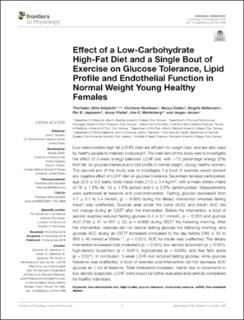| dc.description.abstract | Low-carbohydrate-high-fat (LCHF) diets are efficient for weight loss, and are also used by healthy people to maintain bodyweight. The main aim of this study was to investigate the effect of 3-week energy-balanced LCHF-diet, with >75 percentage energy (E%) from fat, on glucose tolerance and lipid profile in normal weight, young, healthy women. The second aim of the study was to investigate if a bout of exercise would prevent any negative effect of LCHF-diet on glucose tolerance. Seventeen females participated, age 23.5 ± 0.5 years; body mass index 21.0 ± 0.4 kg/m2, with a mean dietary intake of 78 ± 1 E% fat, 19 ± 1 E% protein and 3 ± 0 E% carbohydrates. Measurements were performed at baseline and post-intervention. Fasting glucose decreased from 4.7 ± 0.1 to 4.4 mmol/L (p < 0.001) during the dietary intervention whereas fasting insulin was unaffected. Glucose area under the curve (AUC) and insulin AUC did not change during an OGTT after the intervention. Before the intervention, a bout of aerobic exercise reduced fasting glucose (4.4 ± 0.1 mmol/L, p < 0.001) and glucose AUC (739 ± 41 to 661 ± 25, p = 0.008) during OGTT the following morning. After the intervention, exercise did not reduce fasting glucose the following morning, and glucose AUC during an OGTT increased compared to the day before (789 ± 43 to 889 ± 40 mmol/L∙120min–1, p = 0.001). AUC for insulin was unaffected. The dietary intervention increased total cholesterol (p < 0.001), low-density lipoprotein (p ≤ 0.001), high-density lipoprotein (p = 0.011), triglycerides (p = 0.035), and free fatty acids (p = 0.021). In conclusion, 3-week LCHF-diet reduced fasting glucose, while glucose tolerance was unaffected. A bout of exercise post-intervention did not decrease AUC glucose as it did at baseline. Total cholesterol increased, mainly due to increments in low-density lipoprotein. LCHF-diets should be further evaluated and carefully considered for healthy individuals. | en_US |

